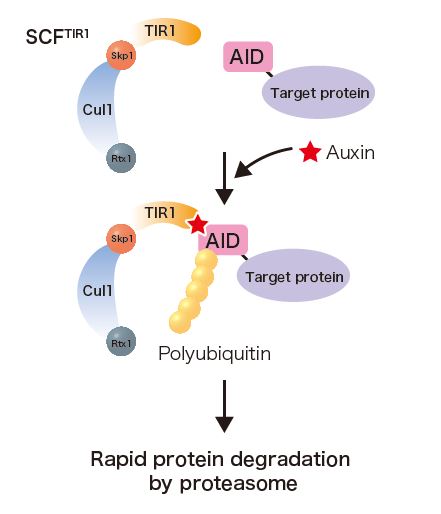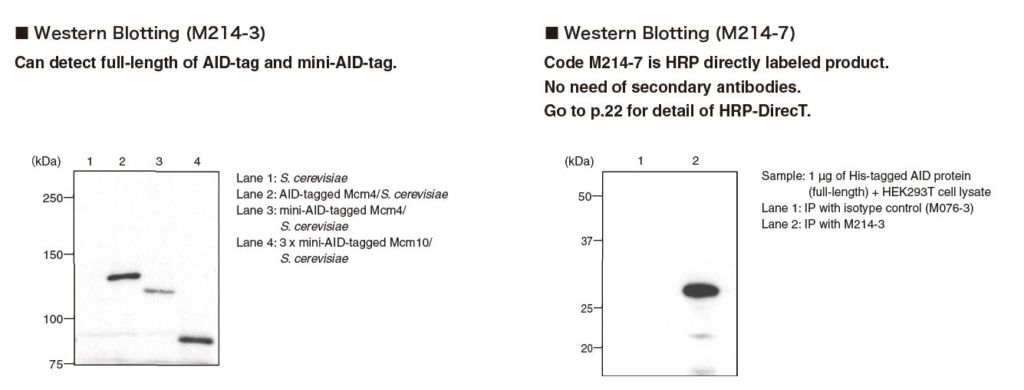mini-AID-tag
Auxin-induced rapid protein degradation
- Both mini-AID-tag and full-length AID-tag can be detected
 Auxin-inducible degron (AID) technology enables depletion of a protein of interest in a half-life less than 30 min by the addition of auxin to culture medium. Auxin includes chemicals such as IAA (indole-3-aceticacid) and NAA (1-naphtalene acetic acid) and includes inhibitors in plants. For the degradation, and SCF ubiquitin ligase complex containing the TIR1 protein is activated via the association of auxin with TIR1. Because the core SCF components are conserved in all eukaryotic cells, it is possible to transplant the degradation pathway to yeast and mammalian cells by expressing TIR1. In those cells expressing TIR1, a protein fused with a degron (AID degron) derived from AUX/IAA can be rapidly degraded in the presence of auxin.
Auxin-inducible degron (AID) technology enables depletion of a protein of interest in a half-life less than 30 min by the addition of auxin to culture medium. Auxin includes chemicals such as IAA (indole-3-aceticacid) and NAA (1-naphtalene acetic acid) and includes inhibitors in plants. For the degradation, and SCF ubiquitin ligase complex containing the TIR1 protein is activated via the association of auxin with TIR1. Because the core SCF components are conserved in all eukaryotic cells, it is possible to transplant the degradation pathway to yeast and mammalian cells by expressing TIR1. In those cells expressing TIR1, a protein fused with a degron (AID degron) derived from AUX/IAA can be rapidly degraded in the presence of auxin.
mini-AID-tag (8kDa) was developed based on the full-length AID-tag (25kDa). Our original anti-mini-AID-tag, Clone 1E4, can detect mini-AID-tag and fulllength AID-tag as well.
*Expression vector can be obtained by RikenBRC, NBRP-Yeast, or Addgene.
*The original picture is provided by Dr. Masato Kanemaki from NIG. The picture on the right was edited by MBL

The performance has been proven in articles.
Natsume T et al . Rapid Protein Depletion in Human Cells by Auxin-Inducible Degron Tagging with Short Homology Donors.
Cell Rep. 15, 210-8 (2016) (PMID:27052166)
Citations
- Nishimura K et al. Nature Methods, 6, 917-222(2009) (PMID:19915560)
- Nishimura K, Kanemaki MT. Current Protocols in Cell Biology, 64, 20.9.1-16(2014) (PMID:25181302)
| CODE NO. | Description | CLONE | ISOTYPE | APPLICATIONS | SIZE |
|---|---|---|---|---|---|
|
1E4
|
Mouse IgG2aκ
|
WB, IP, ICC
|
100 µg/100 µL
|